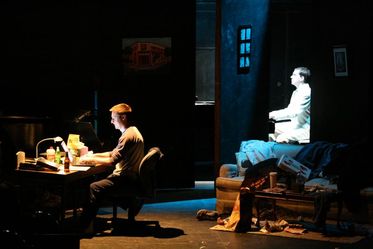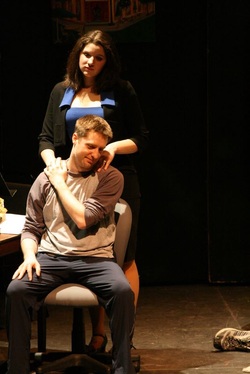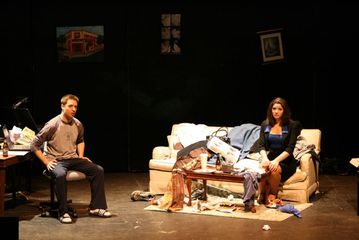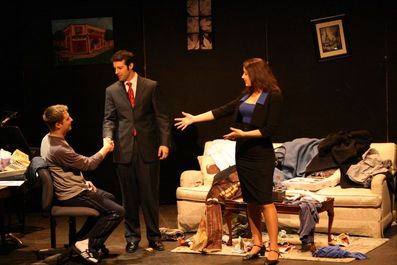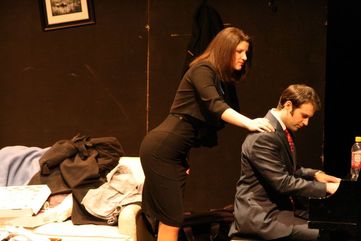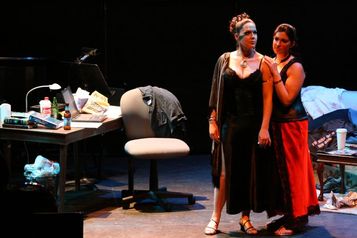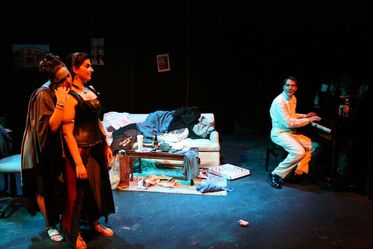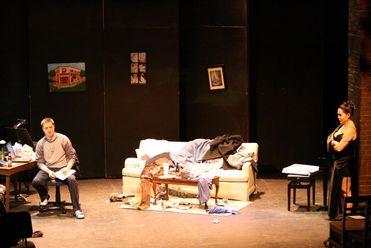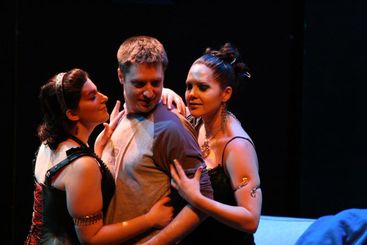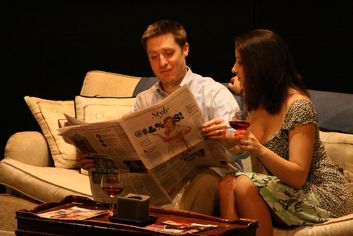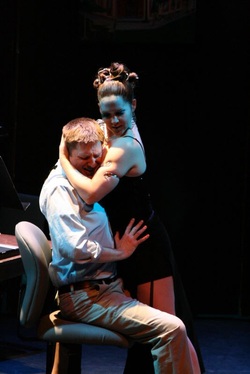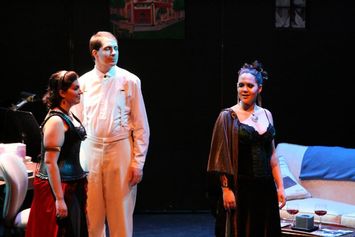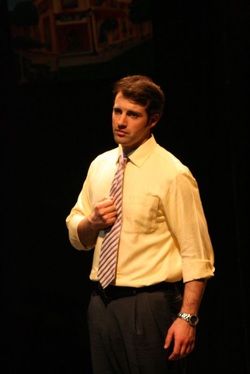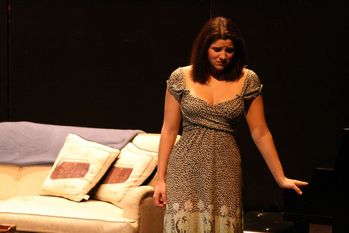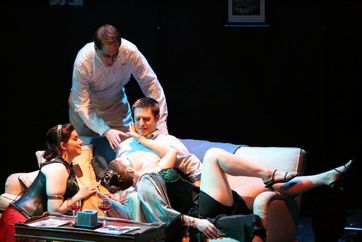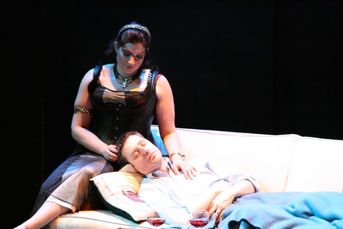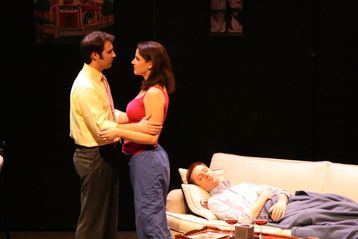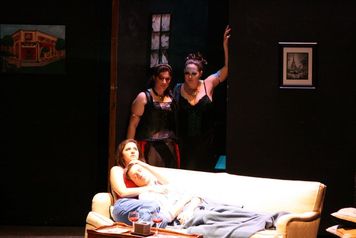Magnum Opus (2009)
A Chamber Opera
Duration: 60:00
Cast:
Claire - Soprano - Robert's wife. An opera singer.
Melpomene - Soprano - The muse of tragedy.
Polyhymnia - Mezzo-Soprano - The muse of sacred poetry.
John - Tenor - A young composer.
Robert - Baritone - Claire's husband. A playwright and arts critic.
Schumann - Baritone - The actual composer Robert Schumann.
Instrumentation: a) flute, Bb clarinet, 2 violins, viola, cello, piano
b) flute, Bb clarinet, violin, viola, cello, piano
c) piano
Setting: Claire and Robert's apartment
Duration: 60:00
Cast:
Claire - Soprano - Robert's wife. An opera singer.
Melpomene - Soprano - The muse of tragedy.
Polyhymnia - Mezzo-Soprano - The muse of sacred poetry.
John - Tenor - A young composer.
Robert - Baritone - Claire's husband. A playwright and arts critic.
Schumann - Baritone - The actual composer Robert Schumann.
Instrumentation: a) flute, Bb clarinet, 2 violins, viola, cello, piano
b) flute, Bb clarinet, violin, viola, cello, piano
c) piano
Setting: Claire and Robert's apartment
Notes
Since this is an opera that deals with Robert Schumann and Johannes Brahms, I imitated their music and even used plenty of quotes of their music throughout the opera. All of the Schumann quotes come from his Liederkreis Op. 39, which is probably my favorite of his works.
I also tried to make each of the characters have a different style of vocal line. Claire and John's line are the most sweeping and romantic, even schmaltzy at times. They are often accompanied by very traditional lush operatic scoring from the orchestra. Melpomene and Polyhymnia have the most showy runs, though Polly occasionally has much simpler, calmer music. Their accompaniment is often very colorful. Robert's music starts fairly simple, but as the story progresses his lines get more erratic. Similarly, his accompaniment goes from very simple and static to colorful and wild. I tried to make Schumann's music very Lied-like whenever possible. He is almost always accompanied by piano and in a very Lied-like style.
I also tried to make each of the characters have a different style of vocal line. Claire and John's line are the most sweeping and romantic, even schmaltzy at times. They are often accompanied by very traditional lush operatic scoring from the orchestra. Melpomene and Polyhymnia have the most showy runs, though Polly occasionally has much simpler, calmer music. Their accompaniment is often very colorful. Robert's music starts fairly simple, but as the story progresses his lines get more erratic. Similarly, his accompaniment goes from very simple and static to colorful and wild. I tried to make Schumann's music very Lied-like whenever possible. He is almost always accompanied by piano and in a very Lied-like style.
Press
"...'Magnum Opus' is definitely ready for the big time."
"The libretto in English by Michael Oberhauser had wonderful poetic phrases and great word selection which made it very easy to listen to and for the singers to sing."
"If you have never enjoyed an opera in English...this will be a certain treat for you to change your mind."
-- Bob Anthony, AllArtsReview4u.com
"[Magnum Opus has] enough in it to make one curious about what it -- or the energy it represented -- might be when it grows up."
-- Anne Midgette, The Washington Post
"... a respectable original score"
-- Brian Reed, The Washington City Paper
Read the full review here
"Oberhauser's hour-long score is accomplished"
"Oberhauser squeezes some beautiful colors from his small ensemble"
-- Charles Downey, DCist.com
Read the full review here
"the opera's 60 minutes go by quickly"
-- Nelson Pressley, GOG Blog, The Washington Post
"accessible, entertaining, and poignant"
"When Philippa mourns the loss of trust in her marriage, a beautiful sorrow that transcends the text finds its true home in Oberhauser’s harrowing melodies and reaches the audience. Empathy is felt. The eyes well up. These are the emotionally loaded moments that are only achievable through opera, and fortunately for us, this production is full of them."
"If you wouldn’t really say that opera is your thing, or if you’ve simply never given the mellifluous art form a try, this would be a perfect place to start."
-- Anna Brungardt, dctheatrescene.com
Read the full review here
"The libretto in English by Michael Oberhauser had wonderful poetic phrases and great word selection which made it very easy to listen to and for the singers to sing."
"If you have never enjoyed an opera in English...this will be a certain treat for you to change your mind."
-- Bob Anthony, AllArtsReview4u.com
"[Magnum Opus has] enough in it to make one curious about what it -- or the energy it represented -- might be when it grows up."
-- Anne Midgette, The Washington Post
"... a respectable original score"
-- Brian Reed, The Washington City Paper
Read the full review here
"Oberhauser's hour-long score is accomplished"
"Oberhauser squeezes some beautiful colors from his small ensemble"
-- Charles Downey, DCist.com
Read the full review here
"the opera's 60 minutes go by quickly"
-- Nelson Pressley, GOG Blog, The Washington Post
"accessible, entertaining, and poignant"
"When Philippa mourns the loss of trust in her marriage, a beautiful sorrow that transcends the text finds its true home in Oberhauser’s harrowing melodies and reaches the audience. Empathy is felt. The eyes well up. These are the emotionally loaded moments that are only achievable through opera, and fortunately for us, this production is full of them."
"If you wouldn’t really say that opera is your thing, or if you’ve simply never given the mellifluous art form a try, this would be a perfect place to start."
-- Anna Brungardt, dctheatrescene.com
Read the full review here
Recordings
Prologue - Orchestra
The prologue is based on Schumann's "Zweilicht." The first 8 bars are even a nearly exact arrangement of the piano intro to that song, arranged for the strings. "Zweilicht" is all about how you can't really trust anybody. I use that feeling to set up the dark mood of the opera.
Scene 1: Duet: Aus der Heimat (Schumann and Robert)
In this scene, Schumann is just putting the finishing touches on writing his "In der Fremde," while Robert is struggling to start his new play. "In der Fremde" is all about loneliness, and Robert feels that same loneliness.
In this scene, Schumann is just putting the finishing touches on writing his "In der Fremde," while Robert is struggling to start his new play. "In der Fremde" is all about loneliness, and Robert feels that same loneliness.
Scene 2: Recitative: You're home early (Robert and Claire)
Claire comes home early, breaking the mood of the previous scene. Several of the themes I use in the rest of the opera are introduced in this scene:
m. 64 - the Home theme
m. 67 - the Success scene
m.94 - the Flirtation theme - which Claire usually only uses with John.
Claire also tends to sing of John with a kind of wonder.
Claire comes home early, breaking the mood of the previous scene. Several of the themes I use in the rest of the opera are introduced in this scene:
m. 64 - the Home theme
m. 67 - the Success scene
m.94 - the Flirtation theme - which Claire usually only uses with John.
Claire also tends to sing of John with a kind of wonder.
Duet: Robert, you never get any work done (Claire and Robert)
An argument erupts - a very precise, well-thought out argument that they've had many times before. The Baroque-ish running notes in the strings mirror this.
An argument erupts - a very precise, well-thought out argument that they've had many times before. The Baroque-ish running notes in the strings mirror this.
Scene 3: Recitative: Oh John, you're here (Claire, John, and Robert)
John is a fairly simple man. He brought in Claire's bags, and that's sort of a victory for him. His sweeping, grand lines show his rather inflated ego.
John is a fairly simple man. He brought in Claire's bags, and that's sort of a victory for him. His sweeping, grand lines show his rather inflated ego.
Song: By the light of the moon (Claire)
John's song for Claire is patterned after Brahms' "Vergebliches Ständchen." The English text scans exactly the same way the German text does, and the lyrics depict a similar conversation between a boy and a girl. I try to mimic Brahms' piano style, especially through the heavy left hand throughout. There's even a quote of "Vergebliches Ständchen" in m. 172. However, unlike Brahms' song, in John's song the boy wins in the end: exactly what John wants to happen between himself and Claire.
Recitative: Well, what do you think? (John, Robert, and Claire)
John further tries to show his dominance by repeatedly cutting Robert off in conversation. Claire even does the same.
John's song for Claire is patterned after Brahms' "Vergebliches Ständchen." The English text scans exactly the same way the German text does, and the lyrics depict a similar conversation between a boy and a girl. I try to mimic Brahms' piano style, especially through the heavy left hand throughout. There's even a quote of "Vergebliches Ständchen" in m. 172. However, unlike Brahms' song, in John's song the boy wins in the end: exactly what John wants to happen between himself and Claire.
Recitative: Well, what do you think? (John, Robert, and Claire)
John further tries to show his dominance by repeatedly cutting Robert off in conversation. Claire even does the same.
Scene 4: Recitative: So, he's writing a play (Polyhymnia, Melpomene, and Schumann)
Here we have a new theme: Robert's Play, which is introduced by Polyhymnia in m. 228 and repeated by the orchestra in m. 231. Melpomene's reaction to the play hopefully gives an immediate characterization for her. Mel and Polly argue about the play, and decide to bring in Schumann himself to help settle the argument. He calls them Florestan and Eusebius - the alter-egos Schumann sometimes wrote as. In Schumann's time, Mel was his Florestan and Polly was his Eusebius. The muses sing a little duet- sort of an incantation- to get Schumann to talk about what his experience with them was like.
Here we have a new theme: Robert's Play, which is introduced by Polyhymnia in m. 228 and repeated by the orchestra in m. 231. Melpomene's reaction to the play hopefully gives an immediate characterization for her. Mel and Polly argue about the play, and decide to bring in Schumann himself to help settle the argument. He calls them Florestan and Eusebius - the alter-egos Schumann sometimes wrote as. In Schumann's time, Mel was his Florestan and Polly was his Eusebius. The muses sing a little duet- sort of an incantation- to get Schumann to talk about what his experience with them was like.
Aria: There is nothing so beautiful (Schumann)
Schumann's aria is based around several Schumann quotes:
m. 281 - "Mondnacht"
m. 306 - "Frühlingsnacht"
m. 313 - "Waldesgespräch"
Recitative: Your own destruction (Polyhymnia and Melpomene)
Schumann's aria is based around several Schumann quotes:
m. 281 - "Mondnacht"
m. 306 - "Frühlingsnacht"
m. 313 - "Waldesgespräch"
Recitative: Your own destruction (Polyhymnia and Melpomene)
Scene 5: Recitative: Ah, here he is (Polyhymnia, Robert, and Melpomene)
Robert is back, and he's upset. In measure 390 the violins intertwine like he imagines Claire and John might do. Finally, the muses make themselves known to him. They tell him who they are: Mel, of course, going for the grander titles, and Polly going for the simpler ones. Robert doesn't quite understand, doesn't quite believe them. So, starting in m. 404 they show off by basically singing runs and high notes. Then he believes them.
Robert is back, and he's upset. In measure 390 the violins intertwine like he imagines Claire and John might do. Finally, the muses make themselves known to him. They tell him who they are: Mel, of course, going for the grander titles, and Polly going for the simpler ones. Robert doesn't quite understand, doesn't quite believe them. So, starting in m. 404 they show off by basically singing runs and high notes. Then he believes them.
Trio: Robert, we offer our aid (Melpomene, Robert, and Polyhymnia)
Mel sets up an driving idea, painting the image of what the muses can do for him. When Robert tries to imagine it, though, he can't quite see the whole picture: his accompaniment is just piano. Polly's caveat is also accompanied by just piano: simpler terms for him to understand.
Mel sets up an driving idea, painting the image of what the muses can do for him. When Robert tries to imagine it, though, he can't quite see the whole picture: his accompaniment is just piano. Polly's caveat is also accompanied by just piano: simpler terms for him to understand.
Interlude - Orchestra
The orchestra goes from commenting on the previous scene to describing the passage of time- probably several months, maybe even a year. The clarinet introduces ideas in Major, and the other instruments slowly drag each idea to minor. The clarinet interrupts with a new theme in Major, and finally wins - the Interlude ends in Major, and Robert has had some success.
The orchestra goes from commenting on the previous scene to describing the passage of time- probably several months, maybe even a year. The clarinet introduces ideas in Major, and the other instruments slowly drag each idea to minor. The clarinet interrupts with a new theme in Major, and finally wins - the Interlude ends in Major, and Robert has had some success.
Scene 6: Recitative: A magnum opus! (Claire, Robert, and John)
The Home and Success themes are interrupted by John - he brings with him the Flirtation theme and his Ego theme. Robert starts a discussion with Claire on the side, but she continues to flirt with John. John then feels bold enough to call Robert "Robbie." He's more freely and openly testing Robert's limits. Robert finally gives up trying to interrupt once the flirtation starts again.
The Home and Success themes are interrupted by John - he brings with him the Flirtation theme and his Ego theme. Robert starts a discussion with Claire on the side, but she continues to flirt with John. John then feels bold enough to call Robert "Robbie." He's more freely and openly testing Robert's limits. Robert finally gives up trying to interrupt once the flirtation starts again.
Scene 7: Recitative: Eight years of marriage (Robert, Polyhymnia, and Melpomene)
The orchestra starts this short and simple bit of recitative with a quote from the end of the scene: "He will surely break. He is so very weak."
Aria: She's in love with him, you fool! (Melpomene)
Mel is purposely increasing the drama and the feeling of hysteria. The 7/8 meter helps to fan the flames.
Funny story about the meter for this aria though: I got the idea from a dog drinking water out of a dish. I was watching a friend's dog, and he drank in that meter (2, 2, 3; 2, 2, 3; 2, 2, 3; 2, 2, 2, 2 - the 3s were him stopping to swallow!) That rhythm felt really compelling to me, so I used it!
Anyway, by m. 741 we're in 4/4. Here, Mel can really hammer it home and explain everything to Robert in very simple terms that he'll understand. Robert rushes out to meet Claire and John at the restaurant.
Recitative: Mel, you don't know if any of that is true (Polyhymnia, Melpomene, and Schumann)
Schumann shows up without being invited - it's not a big break of the rules of their world, since no living human is around to see him.
The orchestra starts this short and simple bit of recitative with a quote from the end of the scene: "He will surely break. He is so very weak."
Aria: She's in love with him, you fool! (Melpomene)
Mel is purposely increasing the drama and the feeling of hysteria. The 7/8 meter helps to fan the flames.
Funny story about the meter for this aria though: I got the idea from a dog drinking water out of a dish. I was watching a friend's dog, and he drank in that meter (2, 2, 3; 2, 2, 3; 2, 2, 3; 2, 2, 2, 2 - the 3s were him stopping to swallow!) That rhythm felt really compelling to me, so I used it!
Anyway, by m. 741 we're in 4/4. Here, Mel can really hammer it home and explain everything to Robert in very simple terms that he'll understand. Robert rushes out to meet Claire and John at the restaurant.
Recitative: Mel, you don't know if any of that is true (Polyhymnia, Melpomene, and Schumann)
Schumann shows up without being invited - it's not a big break of the rules of their world, since no living human is around to see him.
Trio: Melpomene, you have crossed the line (Polyhymnia, Schumann, and Melpomene)
Schumann even is bold enough to rebuke Melpomene - but at least he has Polyhymnia on his side.
Schumann even is bold enough to rebuke Melpomene - but at least he has Polyhymnia on his side.
Scene 8: Recitative: I can't believe the way he acted (Claire and John)
The hysteric 7/8 theme has, through Robert, come into Claire and John's lives.
Aria: I'm just worried about you, Claire (John)
In this sweeping, romantic aria, John takes the events so far a little out of proportion to feed into his white knight fantasy.
Recitative: Out! Get out! (Robert and Claire)
Robert's "Furious" theme is introduced: he has pretty much lost it. However, this is the first time he's had any really strong music. He's standing up to John, but not necessarily with the most sound mind. He tries to calm down and explain everything to Claire, but that doesn't go particularly well.
The hysteric 7/8 theme has, through Robert, come into Claire and John's lives.
Aria: I'm just worried about you, Claire (John)
In this sweeping, romantic aria, John takes the events so far a little out of proportion to feed into his white knight fantasy.
Recitative: Out! Get out! (Robert and Claire)
Robert's "Furious" theme is introduced: he has pretty much lost it. However, this is the first time he's had any really strong music. He's standing up to John, but not necessarily with the most sound mind. He tries to calm down and explain everything to Claire, but that doesn't go particularly well.
Aria: You know this happened? (Claire)
Claire is just as dramatic and moody as Robert. The beginning and end of this aria really drastically change moods. In m. 907, when Claire sings about John, the music gets dreamy - a bit of an insult to Robert - but the music stays dreamy when she sings about Robert. Claire does love Robert, but there is a lot of pain in that love. The non-harmonic tones in the orchestra illustrate this: it's mostly still Major, but the seconds in there make it tinged with a little pain. In m. 983 there's one more slap in the face of a mood change. Nobody's really stable here.
Claire is just as dramatic and moody as Robert. The beginning and end of this aria really drastically change moods. In m. 907, when Claire sings about John, the music gets dreamy - a bit of an insult to Robert - but the music stays dreamy when she sings about Robert. Claire does love Robert, but there is a lot of pain in that love. The non-harmonic tones in the orchestra illustrate this: it's mostly still Major, but the seconds in there make it tinged with a little pain. In m. 983 there's one more slap in the face of a mood change. Nobody's really stable here.
Scene 9: Recitative: What have I done? (Robert, Melpomene, Polyhymnia, and Schumann)
Robert is confused and lost, as shown in the piano. He dwells on his misfortune, and the mistrust of Zweilicht comes in a bit at m. 1000. He blames everything on the Muses. In m. 1050, Polly might start to say something that would cheer Robert up, but he is beyond listening to her now.
Schumann is feeling bolder still: he enters the scene and Robert sees him. This is completely against the "rules," and Polly rebukes him for it. In Schumann's simple, Lied-like arietta starting in m. 1076 he earnestly tries to show Robert what might happen to him - what he himself already lived through.
Robert is confused and lost, as shown in the piano. He dwells on his misfortune, and the mistrust of Zweilicht comes in a bit at m. 1000. He blames everything on the Muses. In m. 1050, Polly might start to say something that would cheer Robert up, but he is beyond listening to her now.
Schumann is feeling bolder still: he enters the scene and Robert sees him. This is completely against the "rules," and Polly rebukes him for it. In Schumann's simple, Lied-like arietta starting in m. 1076 he earnestly tries to show Robert what might happen to him - what he himself already lived through.
Quartet: They'll lock you up (Schumann, Robert, Melpomene, and Polyhymnia)
Disturbingly insistent: Schumann doesn't want Robert to end up like he did, but now he's siding with Mel. Polly attempts to provide a little clarity, but she's drowned out.
Recitative: I must! (Robert, Melpomene, Schumann, and Polyhymnia)
Robert agrees to take his own life. Starting in m. 1204, Robert is helpless, like a child.
Disturbingly insistent: Schumann doesn't want Robert to end up like he did, but now he's siding with Mel. Polly attempts to provide a little clarity, but she's drowned out.
Recitative: I must! (Robert, Melpomene, Schumann, and Polyhymnia)
Robert agrees to take his own life. Starting in m. 1204, Robert is helpless, like a child.
Aria: Sleep, my child (Polyhymnia)
The accompaniment for Polyhymnia's lullaby is derived from the carillon. She can't do anything at this point but calm Robert down and sing him to sleep.
The accompaniment for Polyhymnia's lullaby is derived from the carillon. She can't do anything at this point but calm Robert down and sing him to sleep.
Scene 10: Recitative: Robert, I've found John (Claire and John)
Claire and John return, and Claire is very upset. When they discover Robert, though, the Inspiration theme returns (m. 1288), in a very heavy minor. John, though, still finds a way to be a diva about it. Claire is upset, and John tries to console her with a mini reprise of his aria - but it doesn't quite go according to plan. In m. 1325 Claire has her own "Furious" theme. Hers is not quite as angry as Robert's, though - Perhaps she's not as sincere. Starting in m. 1343, Claire is kicking John out, but perhaps she's also trying to convince herself of her own innocence.
Claire and John return, and Claire is very upset. When they discover Robert, though, the Inspiration theme returns (m. 1288), in a very heavy minor. John, though, still finds a way to be a diva about it. Claire is upset, and John tries to console her with a mini reprise of his aria - but it doesn't quite go according to plan. In m. 1325 Claire has her own "Furious" theme. Hers is not quite as angry as Robert's, though - Perhaps she's not as sincere. Starting in m. 1343, Claire is kicking John out, but perhaps she's also trying to convince herself of her own innocence.
Scene 11: Recitative: Robert, my love (Claire, Melpomene, and Polyhymnia)
Claire finally has some time to privately grieve. In m. 1393 she has the Flirtation theme: the first time she's had it for Robert. Then she sings the same music as Polyhymnia's aria. She has the same function as a muse - Perhaps she was Robert's muse all along.
Claire finally has some time to privately grieve. In m. 1393 she has the Flirtation theme: the first time she's had it for Robert. Then she sings the same music as Polyhymnia's aria. She has the same function as a muse - Perhaps she was Robert's muse all along.
Recording and Photograph Info
All recordings and photographs from the debut performance on Feb. 15, 2009 at Ward Recital Hall, Catholic University. Photographs by Jay D. Brock
Production info:
Music Director: Michael Oberhauser
Director: Jay D. Brock
Lighting Designer: Jason Cowperthwaite
Claire: Sarah Philippa
Melpomene: Daniele Lorio
Polyhymnia: Dominique Donnarumma
John: Robert Legge
Robert: Tad Czyzewski
Schumann: Eric C. Black
Flute: Sophia Musleh
Clarinet: Elena Forbes
Violin 1: Leah Beshore
Violin 2: Laura Yackley
Viola: Elizabeth O'Hara
Cello: Diana Curtis
Piano: Amy Gleason
Production info:
Music Director: Michael Oberhauser
Director: Jay D. Brock
Lighting Designer: Jason Cowperthwaite
Claire: Sarah Philippa
Melpomene: Daniele Lorio
Polyhymnia: Dominique Donnarumma
John: Robert Legge
Robert: Tad Czyzewski
Schumann: Eric C. Black
Flute: Sophia Musleh
Clarinet: Elena Forbes
Violin 1: Leah Beshore
Violin 2: Laura Yackley
Viola: Elizabeth O'Hara
Cello: Diana Curtis
Piano: Amy Gleason
Other Productions
20th Century Opera: Before, During, After...
31 May, 2013 - Calvary Baptist Church, Washington, DC
Produced by Rameen Chaharbaghi
Scene 1: Rameen Chaharbaghi, Robert. Zain Shariff, Schumann. Michael Langlois, piano.
Page-to-Stage Festival Production, September 2009
At the Kennedy Center for the Performing Arts
Directed by Jay D. Brock
Cast:
Claire - Sarah Philippa
Melpomene - Daniele Lorio
Polyhymnia - Tricia Lepofsky
John - Robert Legge
Robert - Tad Czyzewski
Schumann - Eric C. Black
Piano - Amy Gleason
Conductor - Michael Oberhauser
Fringe Festival production, July 2009
The Warehouse Theatre
1021 7th St. NW
Washington, DC 20001
July 9, 12, 16, 18 and 25, 2009
Produced by Opera Alterna
Directed by Jay D. Brock
Lighting Designer - Jason Cowperthwaite
Stage Manager - Jessica Skelton
Cast:
Claire - Sarah Philippa
Melpomene - Daniele Lorio
Polyhymnia - Tricia Lepofsky
John - Robert Legge
Robert - Tad Czyzewski
Eric C. Black (7/12)
Schumann - Eric Sillers
Orchestra:
Flute - Katrina Smith
Clarinet - Elena Forbes
Violin - Josiah Lambert
Alison Candela (7/18)
Viola - Henry Valoris
Cello - Sean Niedlinger
Piano - Nicolas Catravas
Conductor - Michael Oberhauser
Opera for a New Generation, July 9 2009
The Kojo Nnamdi Show, WAMU 88.5 in Washington DC
Interviews with the founders of Opera Alterna and Michael Oberhauser, and selections from Magnum Opus
Kojo Nnamdi, host
Jay D. Brock, co-founder of Opera Alterna, director of Magnum Opus
Sarah Philippa, co-founder of Opera Alterna, Claire in Magnum Opus
Michael Oberhauser, composer of Magnum Opus
Cast:
Claire - Sarah Philippa
Melpomene - Daniele Lorio
Polyhymnia - Tricia Lepofsky
John - Robert Legge
Robert - Tad Czyzewski
Schumann - Eric Sillers
Piano - Nicolas Catravas
Catholic University's Opera Workshop Production, April 2009
Scene 5 was performed with a pre-performance talk by Michael Oberhauser
Directed by Elaine Walter
Cast:
Melpomene - Ashley Alden
Polyhymnia - Danielle Good
Robert - Charles Hyland
Piano - Nicolas Catravas
Conductor - Michael Oberhauser
31 May, 2013 - Calvary Baptist Church, Washington, DC
Produced by Rameen Chaharbaghi
Scene 1: Rameen Chaharbaghi, Robert. Zain Shariff, Schumann. Michael Langlois, piano.
Page-to-Stage Festival Production, September 2009
At the Kennedy Center for the Performing Arts
Directed by Jay D. Brock
Cast:
Claire - Sarah Philippa
Melpomene - Daniele Lorio
Polyhymnia - Tricia Lepofsky
John - Robert Legge
Robert - Tad Czyzewski
Schumann - Eric C. Black
Piano - Amy Gleason
Conductor - Michael Oberhauser
Fringe Festival production, July 2009
The Warehouse Theatre
1021 7th St. NW
Washington, DC 20001
July 9, 12, 16, 18 and 25, 2009
Produced by Opera Alterna
Directed by Jay D. Brock
Lighting Designer - Jason Cowperthwaite
Stage Manager - Jessica Skelton
Cast:
Claire - Sarah Philippa
Melpomene - Daniele Lorio
Polyhymnia - Tricia Lepofsky
John - Robert Legge
Robert - Tad Czyzewski
Eric C. Black (7/12)
Schumann - Eric Sillers
Orchestra:
Flute - Katrina Smith
Clarinet - Elena Forbes
Violin - Josiah Lambert
Alison Candela (7/18)
Viola - Henry Valoris
Cello - Sean Niedlinger
Piano - Nicolas Catravas
Conductor - Michael Oberhauser
Opera for a New Generation, July 9 2009
The Kojo Nnamdi Show, WAMU 88.5 in Washington DC
Interviews with the founders of Opera Alterna and Michael Oberhauser, and selections from Magnum Opus
Kojo Nnamdi, host
Jay D. Brock, co-founder of Opera Alterna, director of Magnum Opus
Sarah Philippa, co-founder of Opera Alterna, Claire in Magnum Opus
Michael Oberhauser, composer of Magnum Opus
Cast:
Claire - Sarah Philippa
Melpomene - Daniele Lorio
Polyhymnia - Tricia Lepofsky
John - Robert Legge
Robert - Tad Czyzewski
Schumann - Eric Sillers
Piano - Nicolas Catravas
Catholic University's Opera Workshop Production, April 2009
Scene 5 was performed with a pre-performance talk by Michael Oberhauser
Directed by Elaine Walter
Cast:
Melpomene - Ashley Alden
Polyhymnia - Danielle Good
Robert - Charles Hyland
Piano - Nicolas Catravas
Conductor - Michael Oberhauser
